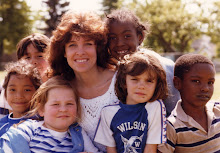I was lucky enough to take courses from one of the leading Gesell Institute researchers, Norm Heimgartner, during my Master's study. The Gesell developmental assessment is based on observing young learners to document their development on a continuum of growth.
During one of Norm's many research stories, he recounted watching a young boy saw on a board for over 20 minutes. Norm finally strolled over and asked him what he was making.
"Sawdust."
Such a perfect kid answer to a predictable adult question. We're product oriented. There should always be an end in sight. Making sawdust comes from an entirely different way of experiencing the world!
Here's another story.
"91, 92, 93, 94 ..." He stopped and looked at me, amazed, eyes wide. "I am so far from one!"
Not only could he count to 100, he had well-developed number sense for a kindergartener.
I still remember that scene over 20 years later because it's stories like this that remind me to listen ever so carefully to little ones.The early childhood folks have known this for a long time--among them Maria Montessori, Jean Piaget, Reggio Emilia, and Vivian Paley. Kids have the right "to grow and learn at their own pace and in their own way" (Arnold Gesell).
Today more and more of our assessments are taking place in front of a computer screen. Assessments are impersonal, devoid of the stories of children's lives. Are kids able to show what they really know? Maybe just as important, what are teachers getting a chance to learn?




No comments:
Post a Comment